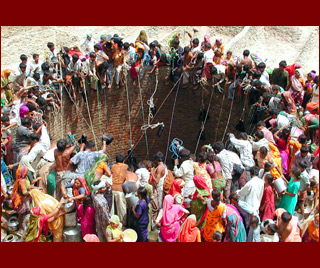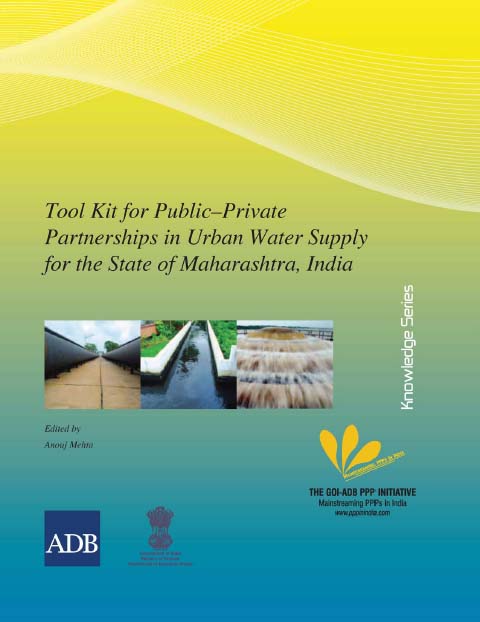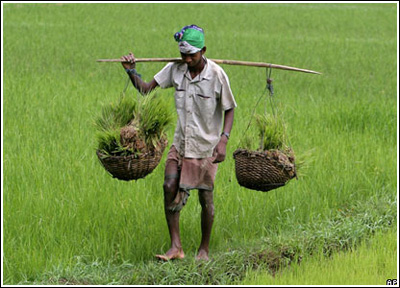Governance
Guidelines of the Central Rural Sanitation Programme and Total Sanitation Campaign by the Department of Drinking Water and Sanitation (2011)
Posted on 25 Jul, 2011 07:30 PMThis document by the Department of Drinking Water and Sanitation deals with the guidelines of the Central Rural Sanitation Programme (CRSP) and Total Sanitation Campaign (TSC). India’s first nationwide programme of rural sanitation, the CRSP was launched in 1986, while TSC was launched in 1999 with the aim of ending open defecation.
Fazilka citizens protest against planned encroachment on ecosensitive Badha lake wetland by Punjab Urban Development Authority (PUDA)
Posted on 21 Jul, 2011 04:16 PMForwarded to the portal by: Graduates Welfare Association, Fazilka
India must prepare for future growth by planning a low-water economy - Article in YaleGlobal Online by Rohini Nilekani
Posted on 19 Jul, 2011 12:37 PMArticle and Image courtesy: YaleGlobal Online
Author: Rohini Nilekani
India and China account for one third of the world’s population; each consumes more freshwater than other nations. Per inhabitant per year, though, India uses less than half what’s used in the US, China uses less than one third. This YaleGlobal series examines India and China’s water use, their expectations for rising demand and recognition that shortages will disrupt economic progress.
The Planning Commission of India repeatedly warns that water will become a more serious issue than land or energy for India in years to come, points out Rohini Nilekani, in the second article of the series. India’s transition from an economy based on agriculture to a mixed one, with water use controlled by states rather than the federal constitution, already leads to conflicts. She urges planning for a low-water economy. Good governance and regulatory frameworks can prevent pollution and waste, while encouraging efficiency, reliable and fair allocation, and wise consumer choices.
 Thirsty earth: Indian villagers in Gujarat gather to draw water from a well
Thirsty earth: Indian villagers in Gujarat gather to draw water from a well
National workshop in July 2011 on social audit of Mahatma Gandhi National Rural Employment Guarantee Scheme (MGNREGs) - PIB Release
Posted on 18 Jul, 2011 04:17 PMArticle courtesy: Press Information Bureau
It was earlier scheduled to be held in Pune on 18th July. The day long workshop is aimed at sharing roadmap for implementation of the audit of rules under MGNREGA by the states and seek clarifications from the ministry.
A world without water – A documentary film by Brian Woods
Posted on 18 Jul, 2011 11:22 AM
Woods builds a case against the growing privatization of the world's dwindling fresh water supply with an unflinching focus on the disturbing picture of the battle for its ownership and the commoditization of the resource. The film raises the question of whether water should be a human right or a tradable commodity.
Assessing variability of water quality in a groundwater-fed perennial lake of Kashmir Himalayas using linear geostatistics – A paper in Journal of Earth System Science
Posted on 17 Jul, 2011 08:47 PMThe study of the hydrochemistry of the Manasbal lake was done to find out whether the lake water was fit for drinking, irrigation and other purposes.
Public-Private Partnerships in urban water supply for Maharashtra – Tool kit by GoI-ADB PPP Initiative
Posted on 16 Jul, 2011 06:48 PM
The various possible PPP structures for the sector were studied, and their applicability assessed in the context of the selected sample cities. Consultations led to development of term sheets for these PPP structures, which were identified as most suitable and feasible for implementation.
The above exercise has led to development of this report, which may be considered as a tool kit designed to help decision makers decide whether a particular project might be suitable for the PPP route or not. The tool kit can, therefore, be the basis for approving a project implementation structure as part of the overall project approval methodology.
Umeed is looking for team member (water project) at Bhopal – Apply by July 20, 2011
Posted on 15 Jul, 2011 04:30 PMContent courtesy: DevNetJobsIndia
Umeed is a non government organization registered on 1995 under the registration & society act , and working in Madhya Pradesh.
Job description:
- To build the project team , assisting and motivating through participative management to ensure effective service delivery to the target community
- To develop a weekly work plan as per the performance indicators for the field workers keeping in mind the quarterly requirements of the project
- To conduct weekly/monthly meetings with the team members
- To maintain key relationships of stakeholders
Centre for Civil Society invites applications for various positions, New Delhi – Apply by July 18, 2011
Posted on 15 Jul, 2011 04:10 PMCentre for Civil Society is an independent public policy think tank based in New Delhi working on outreach, research and advocacy on critical public policy issues that affect India. For the last couple of years, CCS has built a strong portfolio of research and advocacy in education, livelihoods, and governance.
Centre for Civil Society considers all applicants on merits without regard to race, national origin, religious beliefs, gender, marital status or physical disability. CCS is looking for various jobs following below,
Why India's 'growth' focus is ignoring the food access question - Article from Infochange India
Posted on 14 Jul, 2011 11:41 AMArticle and Image courtesy: Infochange India
Author: Rahul Goswami
Celebrating the fact that per capita agricultural income is increasing faster than overall per capita income, the government is targeting 4% growth in agriculture in the Twelfth Plan period. But this is a rosy view that does not stand up to scrutiny.






